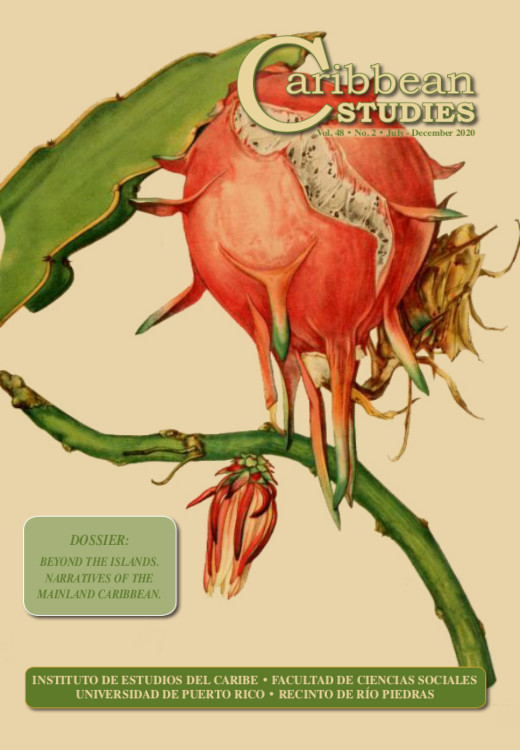Resumen
Las tensiones nacional-regionales que enfrentan espacios caribeños como Yucatán (México), Belice (Centroamérica) y Guyana (Sudamérica), dan lugar a imaginarios insulares, donde estos territorios se representan como aislados, diferentes, lejanos, no encajados; mientras que al mismo tiempo se consideran íconos de identidad regional. Sostengo que es precisamente el tropo de la “isla” dentro de nuestros espacios sin litoral del Caribe lo que abre cuestiones importantes sobre la identidad, el idioma y la conectividad regional. Trabajando desde el Caribe continental, me acerco a la escritura creativa beliceña desde un contexto regional no anglófono que busca revelar las complejidades de la posición de Belice como una “isla” caribeña de habla inglesa en América Central. A través de mi lectura del novelista Zee Edgell, mi primer objetivo es desmantelar la narrativa nacional de Belice para
visualizar las múltiples voces y las historias no contadas en los bordes fluidos de la nación; y, en segundo lugar, revelar la complejidad de las narrativas sobre la identidad nacional de Belice cuando se observa desde una perspectiva transinsular (transfronteriza).
Citas
Abello Vives, A. 2015. La isla encallada: El Caribe colombiano en el archipiélago del Caribe. Bogotá: Siglo del Hombre Editores. Edición de Kindle.
Arzu Scarborough, H. 1996. “Discovering Caribbean Literature, Discovering Self.” The English Journal 85(3):82-84.
Bolland, O.N. 1986. Colonialism and Resistance in Belize. Benque Viejo del Carmen: Cubola Productions. 2003. Colonialism and Resistance in Belize. Benque Viejo del Carmen: Cubola Productions. Second Revised Edition (Digital).
Braithwaite, A.K. 2013. “Reimagining Migration through the Act of Writing in Anglophone Caribbean Women’s Narrative.” Tulsa Studies in Women’s Literature 32(1):143-158.
Bryce, J. 2014. “Adventures In Form: ‘Outsider’ Fiction In The Caribbean.” Journal of Wests Indian Literature 22(2):7-25.
Casey, M.A. 2007. “Postcolonial Ecocriticism and the Cultural Politics of Nature in Belize.” Doctoral Dissertation, Faculty of the Graduate School, The University of Minnesota. Forgotten Populations in Belize’s Literary Landscape... 35
Chan, A. 1999. Speak to Me. Háblame. Belize City: Factory Books.
Chan, A., and J. Aldana. 2005. The Belize National Report on Higher Education. Instituto Internacional de la UNESCO para la Educación Superior en América Latina y el Caribe (Digital edition). Accessed: June 19, 2020. Available at: <https://unesdoc.unesco.org/ark:/48223/pf0000139975>.
Chandler, D., and J. Pugh. 2020. “Islands of relationality and resilience: The shifting stakes of the Anthropocene.” Area 52(1):65-72.
Channel 5 News. Available at: <http://edition.channel5belize.com/archives/136264>.
Cubero, C. 2011. “Caribbean Insular Mobilities.” Suomen Antropologi: Journal of the Finnish Anthropological Society 36(1):5-25. 2017. Caribbean Island Movements. Culebra’s Transinsularities. London/ New York: Rowman and Littlefield Ltd.
Cunin, E. 2015. “Las políticas culturales en Belice: entre la herencia colonial y el reconocimiento de la diferencia,” in A. Campos-García and S. Valero, coords. Identidades políticas en tiempos de Afrodescendencia: auto-determinación, ancestralidad, visibilidad y derechos. Editorial Corregidor. Digital Edition. Accessed: January 4, 2019. Available at: <http://horizon.documentation.ird.fr/exl-doc/pleins_textes/divers17-03/010069605.pdf>.
Cunin, E., and O. Hoffmann. 2013. “From Colonial Domination to the Making of the Nation: Ethno-Racial Categories in Censuses and Reports and their Political Uses in Belize, 19th-20th Centuries.” Caribbean Studies 41(2):31-60.
Deckard, S. 2014. “The Political Ecology of Storms in Caribbean Literature,” in C. Campbell and M. Niblett, eds. The Caribbean: Aesthetics, World-Ecology, Politics. Liverpool: University of Liverpool Press.
De Shield, C. 2011. “Writer, Nation, Text: Beka Lamb and the Metonymic Trinity.” Belizean Studies 31(1):20-33.
De Santos Sousa, B. 2007. “Beyond Abyssal Thinking: From Global Lines to Ecologies of Knowledge.” Review (Fernand Braudel Center), 30(1):45-89.
Durán, V.M. 2007. An Anthology of Belizean Literature. English, Creole, Spanish, Garifuna. Lanham: University Press of America.
Edgell, Z. 1982. Beka Lamb. Oxford: Heinemann Caribbean Writers Series.
. 1991. In times like these. Oxford: Heinemann Caribbean Writers Series.
. 1997. The Festival of San Joaquin. Oxford: MacMillan Caribbean Writers.
. 2007. Time and the River. Oxford: Heinemann Caribbean Writers Series.
García Escobar, J. 2017. “In Conversation: Zee Edgell on Belize, and Writing About Home From Afar.” Asymptote (September 6). Available at: <https://www.asymptotejournal.com/blog/2017/09/06/in-conversation-zelma-edgellon-belize-and-writing-about-home-from-afar/>.
Evaristo, B. 2003. “Zee Edgell.” Bomb Magazine 82 (January). Available at: <https://bombmagazine.org/articles/zee-edgell/>. 36 Margaret Shrimpton Masson
Gómez Menjívar, J.C. 2016. “Precious Water, Priceless Words: Fluidity and Mayan Experience on the Guatemalan-Belizean Border.” Diálogo 19(1):23- 32. Accessed: March 3, 2019. Available at: <https://muse.jhu.edu/article/620566/pdf>.
Hagerthy, T., and M. Gomez Parham, eds. 2000. If Di Pin Neva Ben, Folktales and Legends of Belize (Volume 4). Benque Viejo del Carmen: Cubola Productions (Belizean Writers Series).
Hall, S. 1995. “Negotiating Caribbean Identities.” New Left Review 209:3-14.
Jaggi, M. 2006. “A Life in Writing: Redemption Song.” The Guardian 16/12/2006. Accessed: <https://www.theguardian.com/books/2006/dec/16/featuresreviews.guardianreview15>.
Johnson, M.A. 2018. Becoming Creole: Nature and Race in Belize. New Brunswick: Rutgers University Press.
Jones, G. ed.1977. Anthropology and History in Yucatán. Austin: University of Texas Press.
Judd, K. 1992. “Elite Reproduction and Ethnic Identity in Belize.” Doctoral Dissertation, Graduate Faculty in Anthropology, City University of New York. Accessed: June 19, 2020. Available at: <https://academicworks.cuny. edu/gc_etds/3898>.
McClaurin, I. 1994. “A Writer’s Life: A Country’s Transition.” Americas (English Edition) 46 (4):12-23. Accessed: March 1, 2019. Available at: <https://www.questia.com/library/p435617/americas-english-edition/i2704843/vol-46-no4-july-august>.
Meriwether, R. 2011. “Alternative Communities in Caribbean Literature.” Doctoral Dissertation, Faculty of The Graduate School at The University of North Carolina, Greensboro, USA.
Moody-Freeman, J.E. 2004. “Waking the Gone. Nine Nights as Cultural Remembrance.” Canadian Women’s Journal/Cahiers de la Femme 23(2):30-37.2009. “Zee Edgell: Novelist as Historian/activist (Re)imagining Nation.” African Identities, 7(1):33-53.
Muñoz, I., and D.V. Gibson. 2015. Belize: Decoding the Census. IC² Institute Reports. Austin: University of Texas. Accessed: February 28, 2019. Available at: .
Musa, Y. 1996. The Belize City Poem. Belize City: Factory Books. Available at: <https://www.yassermusa.com/writing.html>.2002. Miami Poem. Mexico City/Belize City: Ex Teresa Arte Actual/ Image Factory Art Foundation. Available at: <https://www.yassermusa.
com/writing.html>. 2014a. “I wake up in the Yucatán.” 39th Caribbean Studies Association Annual Conference, Merida, Yucatán, Mexico. Available at: <https://www.yassermusa.com/writing.html.>. 2014b. The Girl in Black. Available at: < https://www.yassermusa.com/
writing.html>.

